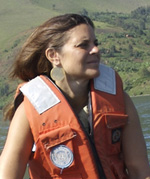IN DEPTH
Will the Arms Trade Treaty Stop the Next Viktor Bout?

Kathi Lynn Austin
The tropical beachfront hotel provided the ideal cover for Russian Andrei Kosolapov to launch his arms trafficking enterprise. With views of the aquamarine sea and a bar stocked with whiskey, all he needed was Mauritius government approval of his application for an air operation certificate.
When I interviewed Kosolapov in June 2012 at the White Shell Restaurant and Lounge, he had the aircraft, pilots, shell companies, and corrupt local officials in place. He was just waiting for the official go ahead before he could start smuggling weapons to some of the world's worst conflict zones: Sudan, Democratic Republic of Congo, or even possibly Syria. He even had a tried and true alibi if he got caught red-handed with the guns: he would claim he was nothing more than a "transporter."
Kosolapov had learned the tricks of the black market trade from a master, his former boss, Viktor Bout. Commonly referred to as the "Merchant of Death," Bout had amassed millions from his UN sanctions-busting business and had evaded accountability for nearly two decades by exploiting legal loopholes, inconsistent national laws, and the lack of an international system to regulate the arms dealers operating across national borders. Bout had been able to use the "I'm just a transporter" excuse because so few States had a robust definition of an "arms broker."
The technical term "arms broker" refers to the weapons middlemen—the support bridge between the suppliers and shooters. Of the four primary actors involved in an international arms deal: supplier, broker, delivery agent, and end-users, only one facilitates this transaction from start to finish—the broker. And since the broker is the central actor using the cover of legitimate business to divert weapons into the illicit trade, this should be the one requiring the strictest regulation.
For law enforcement officials, UN arms experts, and arms trafficking investigators like myself, the Arms Trade Treaty (ATT) held out high hopes for a new international tool that would make it harder for illegal gunrunners to ply their deadly business. But will the adoption of the ATT this past April impede the trafficking kingpins who hope to fill Viktor Bout's shoes?
The answer to this question lies not in the text of the ATT but in its forceful implementation.
Thanks to strong pressure by civil society and progressive states, the ATT includes a substantial section addressing "diversion," a classic technique used by criminals to funnel legally purchased weapons into illicit pipelines. But the section of the ATT specifically devoted to brokering is the weakest. That article contains only two water-downed sentences that fall short of creating the compulsory international standard and licensing regime that would have made a significant difference to the tens of thousands that innocently fall victim to conflict.
Out of the 52 countries or so that have legislation on arms brokers, only a few, such as the US, have definitions that contain the full array of middlemen, including for instance the transporters and financiers. Even fewer nations require the registration, licensing, and extraterritorial oversight of these actors. Additionally, without a global watch list, unsuspecting countries will continue to face hardship trying to distinguish rogue operators from legitimate traders.
Advocates cannot simply stand by and allow governments to regulate the brokers as they see fit. As States begin to use the ATT's guidelines to enact effective legislation, concerted action is needed to address the deficits of the ATT's sketchy language on arms brokering. What should governments be pressured to do to ensure that illicit arms traffickers do not evade the new global rulebook?
For a start, I recommend these "Seven Golden Rules":
- Enact a Comprehensive Definition of Brokering: The definition must be broad enough to cover the wide range of activities in which brokers engage. For instance, it should incorporate transporters, financial agents, insurance providers, and all other facilitators.
- License and register: National regulations must include the registration of all brokers, even those operating extra-territorially. It should also require the licensing of each international weapons transaction on a case-by-case basis.
- Verify, verify, and verify: Both exporting and importing States should verify that the brokers involved have been properly registered and licensed and that the arms transferred are checked against the applicable licenses.
- Take responsibility beyond borders: States must regulate the activities of their nationals both at home and abroad. Without an extra-territorial application, traffickers will simply operate in countries where there is weak regulation or enforcement.
- Make it a team effort: States should proactively assist each other with the investigations and prosecutions of suspect brokers. Such collaboration will be more effective against nimble traffickers and transnational criminal networks.
- Record and share: States must maintain adequate records and exchange information regarding the activities of illicit brokers. The ability to flag illegal brokers is a key to holding them accountable.
- Criminalize and penalize: National laws should classify brokering violations as criminal offense and set adequate penalties for their contravention.
The Arms Trade Treaty is a potential game-changer in the fight against the scourge of illicit arms traffickers. To ensure its life-saving potential, States must go the final distance. They must demonstrate the political will to rise above the weak standard governing brokering within the treaty text. Instead, they should look to emulate nations that already have robust laws on the books to effectively achieve the highest possible international standard. Until then, the legacy of war profiteers such as Viktor Bout will live on.
[1] The Conflict Awareness Project is an international non-governmental organization that investigates and brings to justice major arms traffickers, war profiteers and transnational criminal networks that fuel conflict around the world.